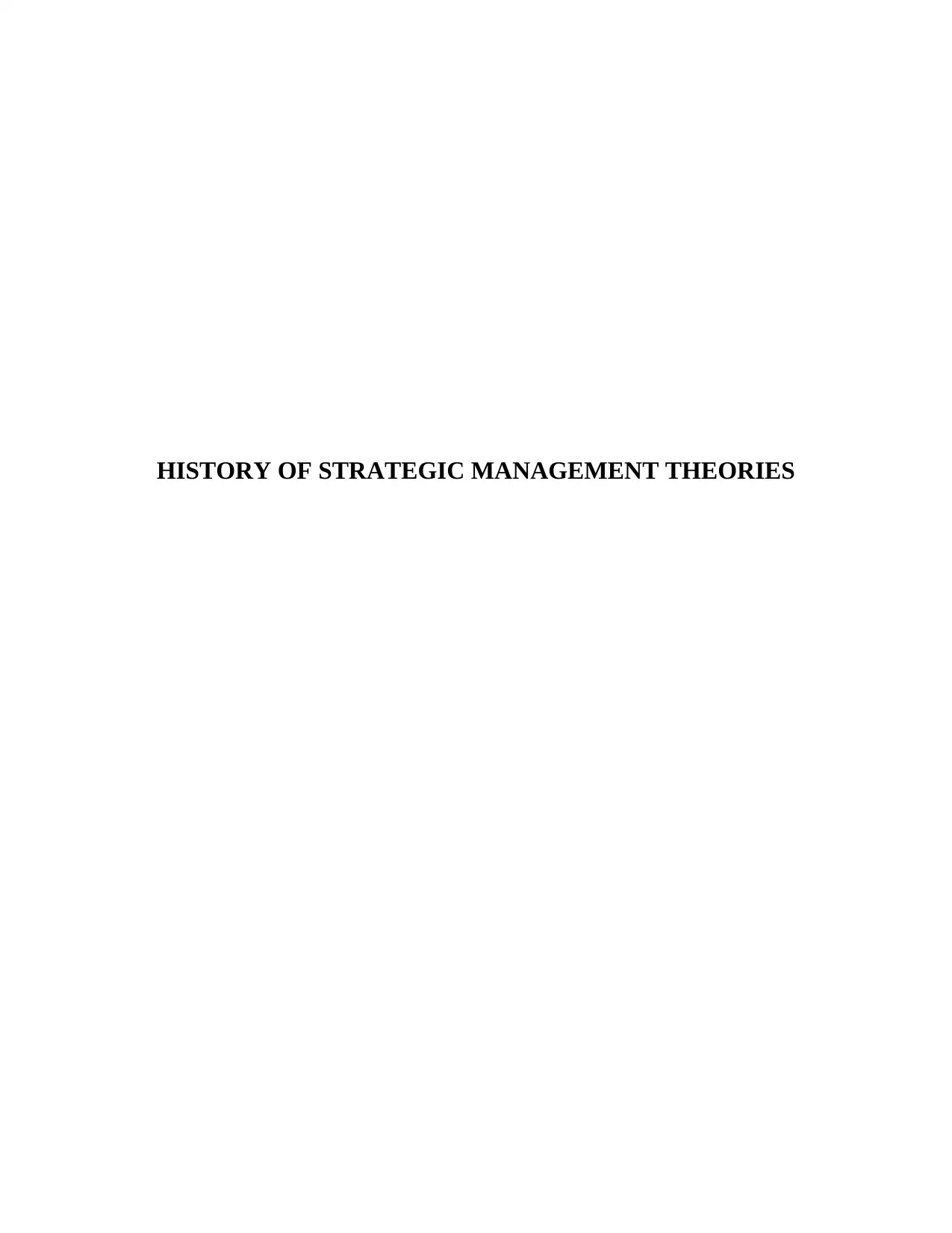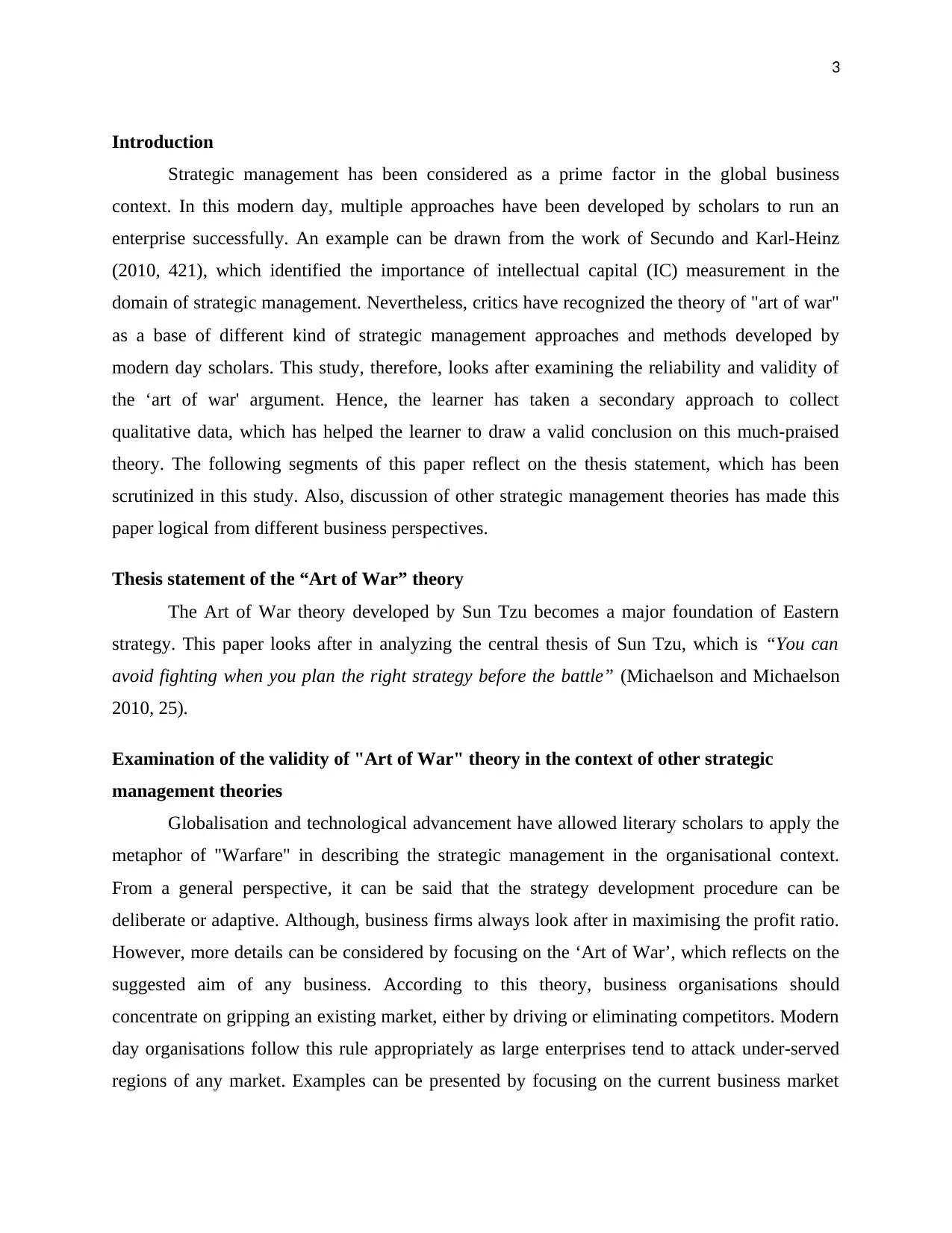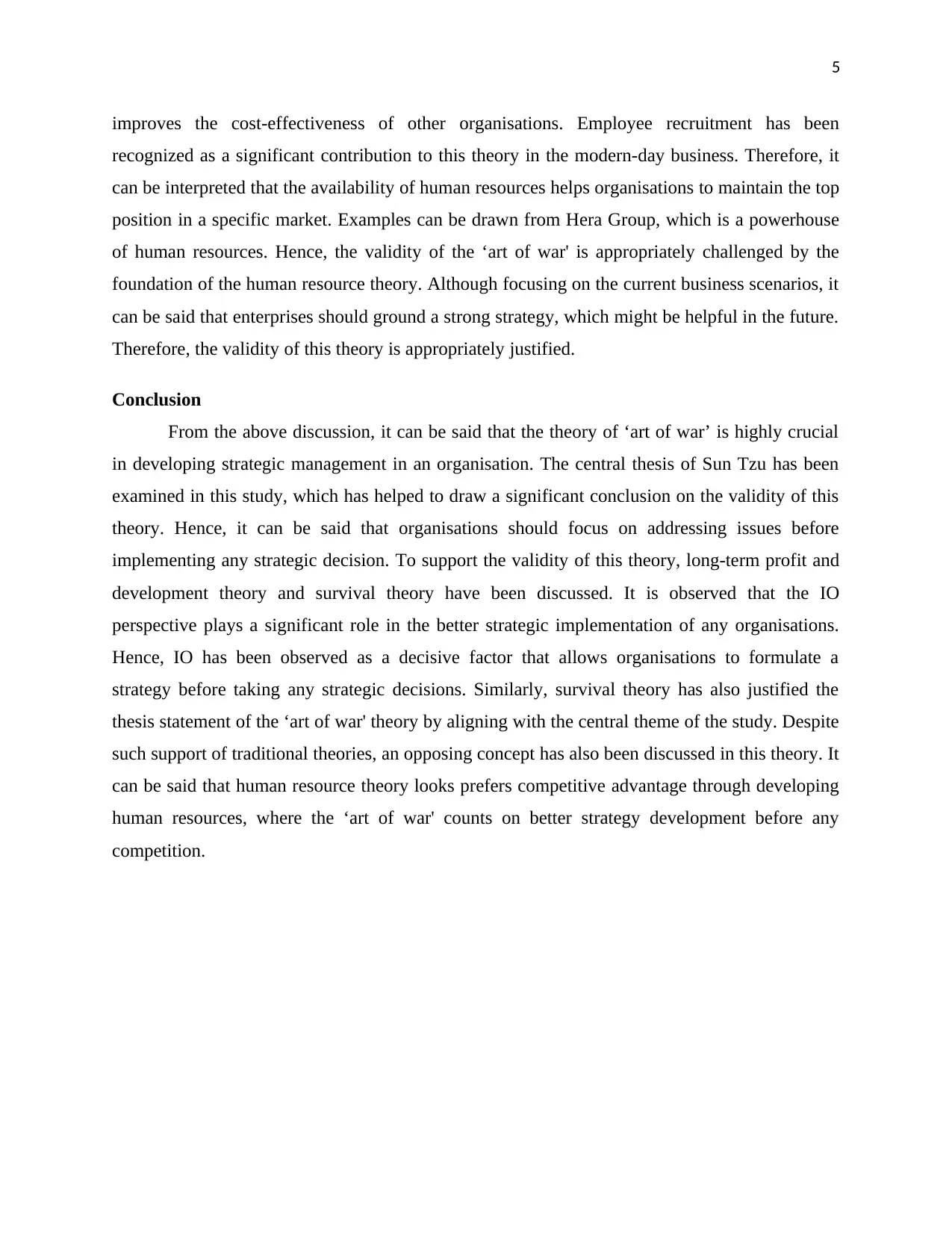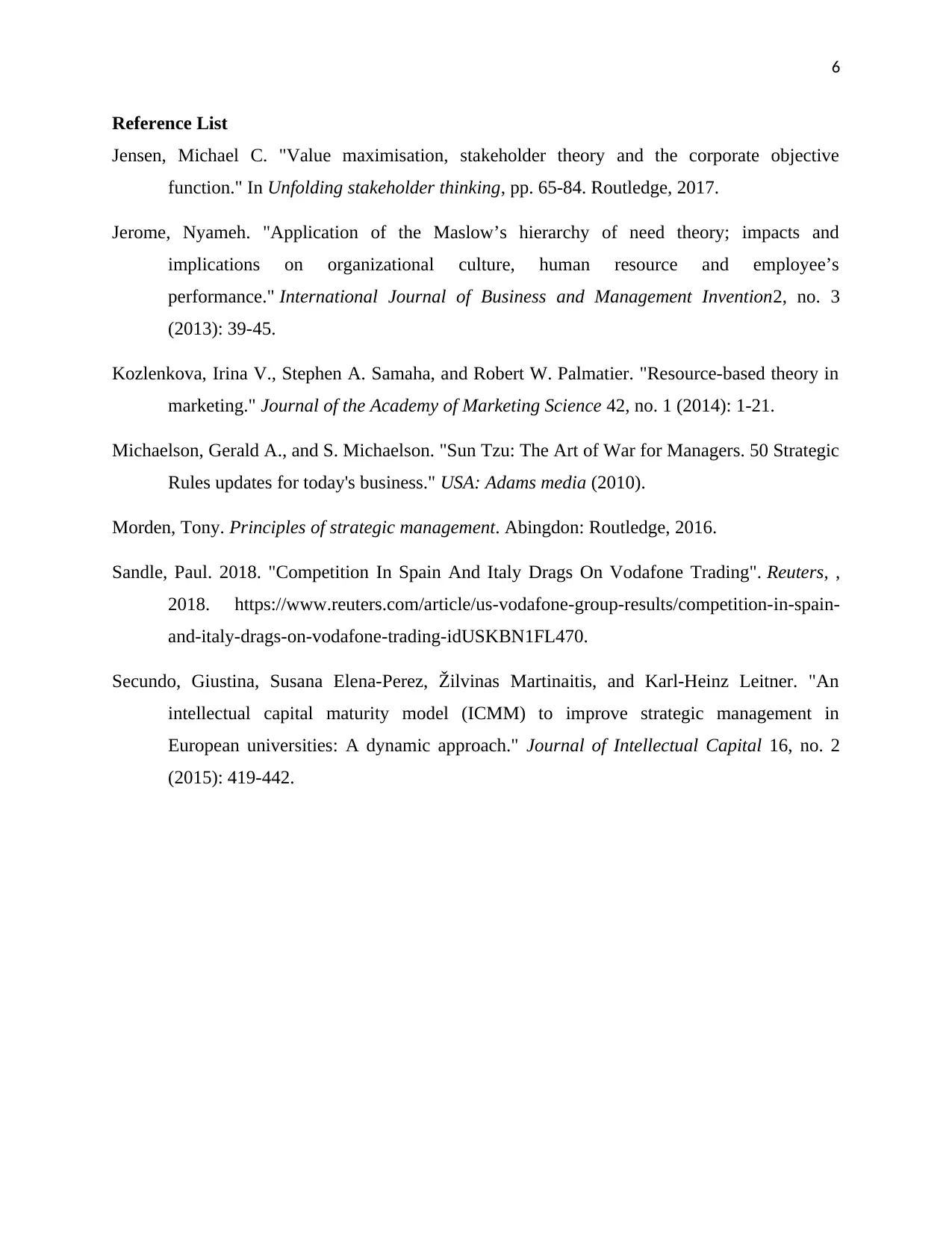Analysis of 'Art of War' Theory in Modern Strategic Management
VerifiedAdded on 2023/05/30
|6
|1545
|347
Essay
AI Summary
This essay examines the validity of Sun Tzu's 'Art of War' theory in the context of modern strategic management theories. It analyzes the central thesis that strategic planning before conflict is crucial for success. The essay discusses how globalization and technological advancements have allowed scholars to apply the 'Warfare' metaphor to organizational strategic management. It evaluates the theory through the lenses of profit maximization, competition, and survival-based approaches, referencing examples like Vodafone's market share deterioration in Italy. The essay also considers opposing viewpoints, such as human resource theory, which emphasizes the importance of human capital over strategic planning. Ultimately, the essay concludes that while the 'Art of War' theory remains relevant, a balanced approach considering both strategic planning and human resources is essential for contemporary organizations. Desklib provides a platform to access this essay along with numerous other solved assignments and past papers.

HISTORY OF STRATEGIC MANAGEMENT THEORIES
Paraphrase This Document
Need a fresh take? Get an instant paraphrase of this document with our AI Paraphraser

2
Table of Contents
Introduction......................................................................................................................................3
Thesis statement of the “Art of War” theory...................................................................................3
Examination of the validity of "Art of War" theory in the context of other strategic management
theories.............................................................................................................................................3
Conclusion.......................................................................................................................................5
Table of Contents
Introduction......................................................................................................................................3
Thesis statement of the “Art of War” theory...................................................................................3
Examination of the validity of "Art of War" theory in the context of other strategic management
theories.............................................................................................................................................3
Conclusion.......................................................................................................................................5

3
Introduction
Strategic management has been considered as a prime factor in the global business
context. In this modern day, multiple approaches have been developed by scholars to run an
enterprise successfully. An example can be drawn from the work of Secundo and Karl-Heinz
(2010, 421), which identified the importance of intellectual capital (IC) measurement in the
domain of strategic management. Nevertheless, critics have recognized the theory of "art of war"
as a base of different kind of strategic management approaches and methods developed by
modern day scholars. This study, therefore, looks after examining the reliability and validity of
the ‘art of war' argument. Hence, the learner has taken a secondary approach to collect
qualitative data, which has helped the learner to draw a valid conclusion on this much-praised
theory. The following segments of this paper reflect on the thesis statement, which has been
scrutinized in this study. Also, discussion of other strategic management theories has made this
paper logical from different business perspectives.
Thesis statement of the “Art of War” theory
The Art of War theory developed by Sun Tzu becomes a major foundation of Eastern
strategy. This paper looks after in analyzing the central thesis of Sun Tzu, which is “You can
avoid fighting when you plan the right strategy before the battle” (Michaelson and Michaelson
2010, 25).
Examination of the validity of "Art of War" theory in the context of other strategic
management theories
Globalisation and technological advancement have allowed literary scholars to apply the
metaphor of "Warfare" in describing the strategic management in the organisational context.
From a general perspective, it can be said that the strategy development procedure can be
deliberate or adaptive. Although, business firms always look after in maximising the profit ratio.
However, more details can be considered by focusing on the ‘Art of War’, which reflects on the
suggested aim of any business. According to this theory, business organisations should
concentrate on gripping an existing market, either by driving or eliminating competitors. Modern
day organisations follow this rule appropriately as large enterprises tend to attack under-served
regions of any market. Examples can be presented by focusing on the current business market
Introduction
Strategic management has been considered as a prime factor in the global business
context. In this modern day, multiple approaches have been developed by scholars to run an
enterprise successfully. An example can be drawn from the work of Secundo and Karl-Heinz
(2010, 421), which identified the importance of intellectual capital (IC) measurement in the
domain of strategic management. Nevertheless, critics have recognized the theory of "art of war"
as a base of different kind of strategic management approaches and methods developed by
modern day scholars. This study, therefore, looks after examining the reliability and validity of
the ‘art of war' argument. Hence, the learner has taken a secondary approach to collect
qualitative data, which has helped the learner to draw a valid conclusion on this much-praised
theory. The following segments of this paper reflect on the thesis statement, which has been
scrutinized in this study. Also, discussion of other strategic management theories has made this
paper logical from different business perspectives.
Thesis statement of the “Art of War” theory
The Art of War theory developed by Sun Tzu becomes a major foundation of Eastern
strategy. This paper looks after in analyzing the central thesis of Sun Tzu, which is “You can
avoid fighting when you plan the right strategy before the battle” (Michaelson and Michaelson
2010, 25).
Examination of the validity of "Art of War" theory in the context of other strategic
management theories
Globalisation and technological advancement have allowed literary scholars to apply the
metaphor of "Warfare" in describing the strategic management in the organisational context.
From a general perspective, it can be said that the strategy development procedure can be
deliberate or adaptive. Although, business firms always look after in maximising the profit ratio.
However, more details can be considered by focusing on the ‘Art of War’, which reflects on the
suggested aim of any business. According to this theory, business organisations should
concentrate on gripping an existing market, either by driving or eliminating competitors. Modern
day organisations follow this rule appropriately as large enterprises tend to attack under-served
regions of any market. Examples can be presented by focusing on the current business market
⊘ This is a preview!⊘
Do you want full access?
Subscribe today to unlock all pages.

Trusted by 1+ million students worldwide

4
situation in Italy. It is observed that Vodafone, being a global leader in the Telecom industry has
faced the significant deterioration of market share in Italy, after the introduction of the joint
venture of Wind Italy and 3 Italia (Sandle 2018). Hence, various findings can be found from this
case of business deterioration of Vodafone in Italy. However, to justify the validity of the thesis
statement, profit maximization and competition based theory and survival based approach can be
critically interpreted.
According to Jensen (2017, 70), maximization of long-term profit and development of
long-term sustainability is the primary agenda of the profit maximisation theory. It is identified
that the perspective of Industrial Organisation (IO) is the principal foundation of philosophy.
Hence, it is considered that developing a significant IO is highly necessary for enhancing the
strategic management of any organization. From this discussion, it can be said that the IO helps
organisations to improve their strategy, which justifies with the theory of ‘art of war.' In this
context, it can be interpreted that lack of appropriate IO has disallowed Vodafone to propose its
strategies in Italy. As a result, the company has faced profitability issues significantly. Critics
have acclaimed the importance of survival theory also, which can be proved essential in this
context. Survival theory reflects on the need for organisations, which is to survive in a highly
competitive market. Hence, critics have emphasized the environmental aspects rather than
focusing on others. In this regard, Jerome (2014, 40) argued that the resource-based theory is
highly distinctive than other strategic management theories, as it overlooks the importance of
human resources in a business context. Therefore, the central thesis of ‘art of war’ theory can be
properly justified in this context. It can be said that extensive research on the external and
internal environment can help business leaders and strategists to craft effective business strategy.
Henceforth, a well-developed strategy by proper environmental scanning can easily put an
organization much ahead than its competitors. Despite such justification from these theories,
some other theories are also developed by scholars, which challenge the validity of the ‘art of
war’ theory.
According to Kozlenkova and Palmatier (2014, 16), human resource theory is the
ultimate theory that can be applied by organisations of the modern day. It is crucial that this
theory praises the engagement of human resources in an organizational context. The primary
agenda of developing this theory is to isolate resource-based problems, which were encountered
after the global financial crisis in 2007-2008. It is identified that human-based resource theory
situation in Italy. It is observed that Vodafone, being a global leader in the Telecom industry has
faced the significant deterioration of market share in Italy, after the introduction of the joint
venture of Wind Italy and 3 Italia (Sandle 2018). Hence, various findings can be found from this
case of business deterioration of Vodafone in Italy. However, to justify the validity of the thesis
statement, profit maximization and competition based theory and survival based approach can be
critically interpreted.
According to Jensen (2017, 70), maximization of long-term profit and development of
long-term sustainability is the primary agenda of the profit maximisation theory. It is identified
that the perspective of Industrial Organisation (IO) is the principal foundation of philosophy.
Hence, it is considered that developing a significant IO is highly necessary for enhancing the
strategic management of any organization. From this discussion, it can be said that the IO helps
organisations to improve their strategy, which justifies with the theory of ‘art of war.' In this
context, it can be interpreted that lack of appropriate IO has disallowed Vodafone to propose its
strategies in Italy. As a result, the company has faced profitability issues significantly. Critics
have acclaimed the importance of survival theory also, which can be proved essential in this
context. Survival theory reflects on the need for organisations, which is to survive in a highly
competitive market. Hence, critics have emphasized the environmental aspects rather than
focusing on others. In this regard, Jerome (2014, 40) argued that the resource-based theory is
highly distinctive than other strategic management theories, as it overlooks the importance of
human resources in a business context. Therefore, the central thesis of ‘art of war’ theory can be
properly justified in this context. It can be said that extensive research on the external and
internal environment can help business leaders and strategists to craft effective business strategy.
Henceforth, a well-developed strategy by proper environmental scanning can easily put an
organization much ahead than its competitors. Despite such justification from these theories,
some other theories are also developed by scholars, which challenge the validity of the ‘art of
war’ theory.
According to Kozlenkova and Palmatier (2014, 16), human resource theory is the
ultimate theory that can be applied by organisations of the modern day. It is crucial that this
theory praises the engagement of human resources in an organizational context. The primary
agenda of developing this theory is to isolate resource-based problems, which were encountered
after the global financial crisis in 2007-2008. It is identified that human-based resource theory
Paraphrase This Document
Need a fresh take? Get an instant paraphrase of this document with our AI Paraphraser

5
improves the cost-effectiveness of other organisations. Employee recruitment has been
recognized as a significant contribution to this theory in the modern-day business. Therefore, it
can be interpreted that the availability of human resources helps organisations to maintain the top
position in a specific market. Examples can be drawn from Hera Group, which is a powerhouse
of human resources. Hence, the validity of the ‘art of war' is appropriately challenged by the
foundation of the human resource theory. Although focusing on the current business scenarios, it
can be said that enterprises should ground a strong strategy, which might be helpful in the future.
Therefore, the validity of this theory is appropriately justified.
Conclusion
From the above discussion, it can be said that the theory of ‘art of war’ is highly crucial
in developing strategic management in an organisation. The central thesis of Sun Tzu has been
examined in this study, which has helped to draw a significant conclusion on the validity of this
theory. Hence, it can be said that organisations should focus on addressing issues before
implementing any strategic decision. To support the validity of this theory, long-term profit and
development theory and survival theory have been discussed. It is observed that the IO
perspective plays a significant role in the better strategic implementation of any organisations.
Hence, IO has been observed as a decisive factor that allows organisations to formulate a
strategy before taking any strategic decisions. Similarly, survival theory has also justified the
thesis statement of the ‘art of war' theory by aligning with the central theme of the study. Despite
such support of traditional theories, an opposing concept has also been discussed in this theory. It
can be said that human resource theory looks prefers competitive advantage through developing
human resources, where the ‘art of war' counts on better strategy development before any
competition.
improves the cost-effectiveness of other organisations. Employee recruitment has been
recognized as a significant contribution to this theory in the modern-day business. Therefore, it
can be interpreted that the availability of human resources helps organisations to maintain the top
position in a specific market. Examples can be drawn from Hera Group, which is a powerhouse
of human resources. Hence, the validity of the ‘art of war' is appropriately challenged by the
foundation of the human resource theory. Although focusing on the current business scenarios, it
can be said that enterprises should ground a strong strategy, which might be helpful in the future.
Therefore, the validity of this theory is appropriately justified.
Conclusion
From the above discussion, it can be said that the theory of ‘art of war’ is highly crucial
in developing strategic management in an organisation. The central thesis of Sun Tzu has been
examined in this study, which has helped to draw a significant conclusion on the validity of this
theory. Hence, it can be said that organisations should focus on addressing issues before
implementing any strategic decision. To support the validity of this theory, long-term profit and
development theory and survival theory have been discussed. It is observed that the IO
perspective plays a significant role in the better strategic implementation of any organisations.
Hence, IO has been observed as a decisive factor that allows organisations to formulate a
strategy before taking any strategic decisions. Similarly, survival theory has also justified the
thesis statement of the ‘art of war' theory by aligning with the central theme of the study. Despite
such support of traditional theories, an opposing concept has also been discussed in this theory. It
can be said that human resource theory looks prefers competitive advantage through developing
human resources, where the ‘art of war' counts on better strategy development before any
competition.

6
Reference List
Jensen, Michael C. "Value maximisation, stakeholder theory and the corporate objective
function." In Unfolding stakeholder thinking, pp. 65-84. Routledge, 2017.
Jerome, Nyameh. "Application of the Maslow’s hierarchy of need theory; impacts and
implications on organizational culture, human resource and employee’s
performance." International Journal of Business and Management Invention2, no. 3
(2013): 39-45.
Kozlenkova, Irina V., Stephen A. Samaha, and Robert W. Palmatier. "Resource-based theory in
marketing." Journal of the Academy of Marketing Science 42, no. 1 (2014): 1-21.
Michaelson, Gerald A., and S. Michaelson. "Sun Tzu: The Art of War for Managers. 50 Strategic
Rules updates for today's business." USA: Adams media (2010).
Morden, Tony. Principles of strategic management. Abingdon: Routledge, 2016.
Sandle, Paul. 2018. "Competition In Spain And Italy Drags On Vodafone Trading". Reuters, ,
2018. https://www.reuters.com/article/us-vodafone-group-results/competition-in-spain-
and-italy-drags-on-vodafone-trading-idUSKBN1FL470.
Secundo, Giustina, Susana Elena-Perez, Žilvinas Martinaitis, and Karl-Heinz Leitner. "An
intellectual capital maturity model (ICMM) to improve strategic management in
European universities: A dynamic approach." Journal of Intellectual Capital 16, no. 2
(2015): 419-442.
Reference List
Jensen, Michael C. "Value maximisation, stakeholder theory and the corporate objective
function." In Unfolding stakeholder thinking, pp. 65-84. Routledge, 2017.
Jerome, Nyameh. "Application of the Maslow’s hierarchy of need theory; impacts and
implications on organizational culture, human resource and employee’s
performance." International Journal of Business and Management Invention2, no. 3
(2013): 39-45.
Kozlenkova, Irina V., Stephen A. Samaha, and Robert W. Palmatier. "Resource-based theory in
marketing." Journal of the Academy of Marketing Science 42, no. 1 (2014): 1-21.
Michaelson, Gerald A., and S. Michaelson. "Sun Tzu: The Art of War for Managers. 50 Strategic
Rules updates for today's business." USA: Adams media (2010).
Morden, Tony. Principles of strategic management. Abingdon: Routledge, 2016.
Sandle, Paul. 2018. "Competition In Spain And Italy Drags On Vodafone Trading". Reuters, ,
2018. https://www.reuters.com/article/us-vodafone-group-results/competition-in-spain-
and-italy-drags-on-vodafone-trading-idUSKBN1FL470.
Secundo, Giustina, Susana Elena-Perez, Žilvinas Martinaitis, and Karl-Heinz Leitner. "An
intellectual capital maturity model (ICMM) to improve strategic management in
European universities: A dynamic approach." Journal of Intellectual Capital 16, no. 2
(2015): 419-442.
⊘ This is a preview!⊘
Do you want full access?
Subscribe today to unlock all pages.

Trusted by 1+ million students worldwide
1 out of 6
Your All-in-One AI-Powered Toolkit for Academic Success.
+13062052269
info@desklib.com
Available 24*7 on WhatsApp / Email
![[object Object]](/_next/static/media/star-bottom.7253800d.svg)
Unlock your academic potential
Copyright © 2020–2025 A2Z Services. All Rights Reserved. Developed and managed by ZUCOL.
